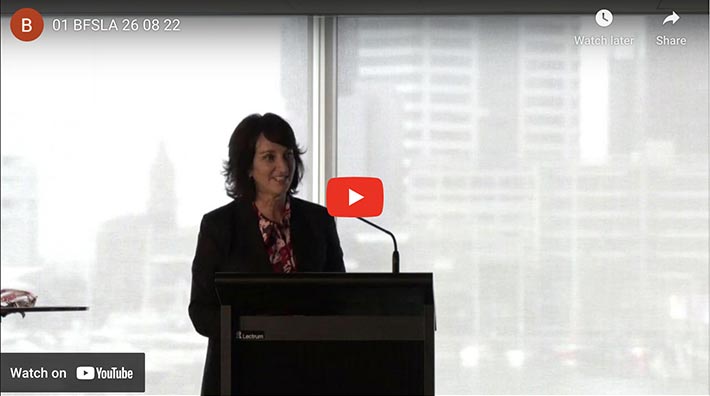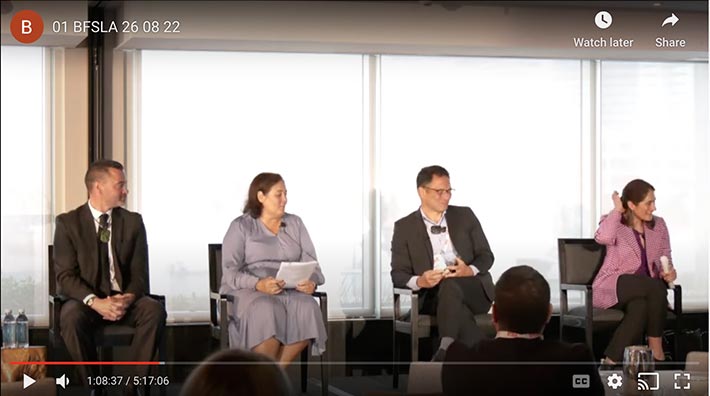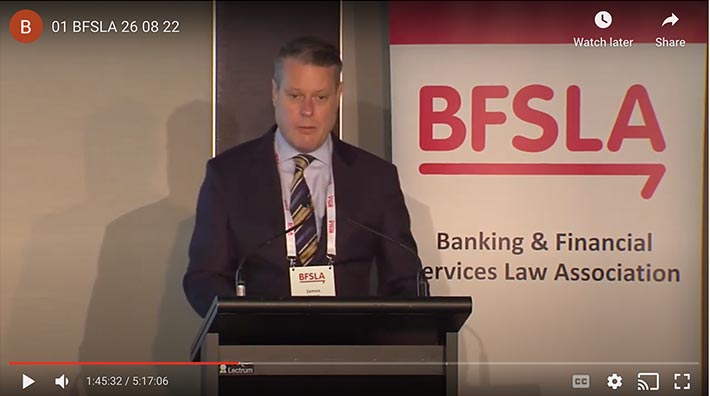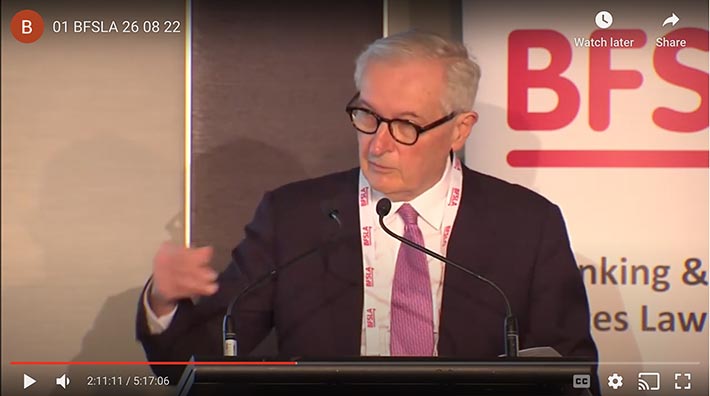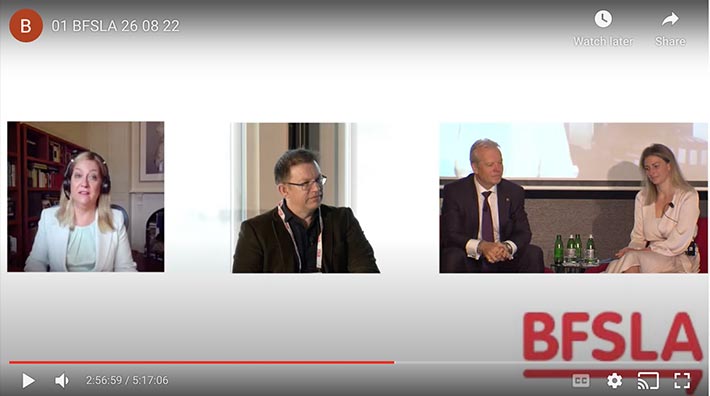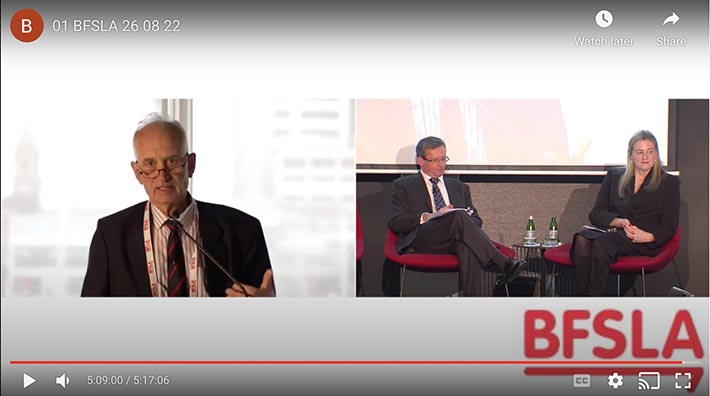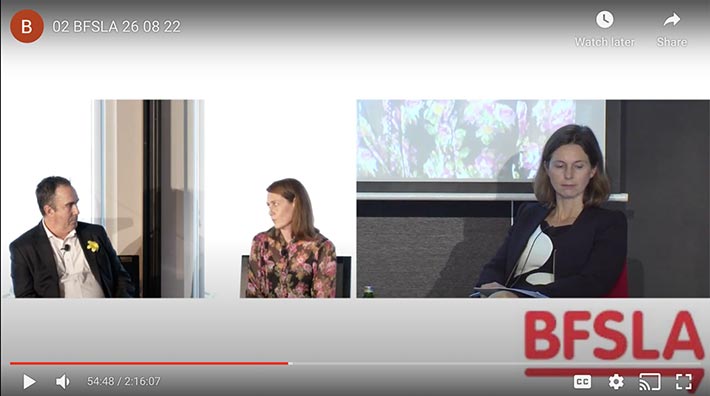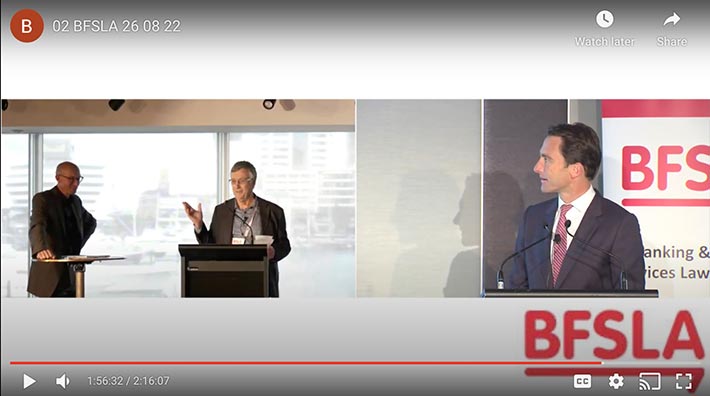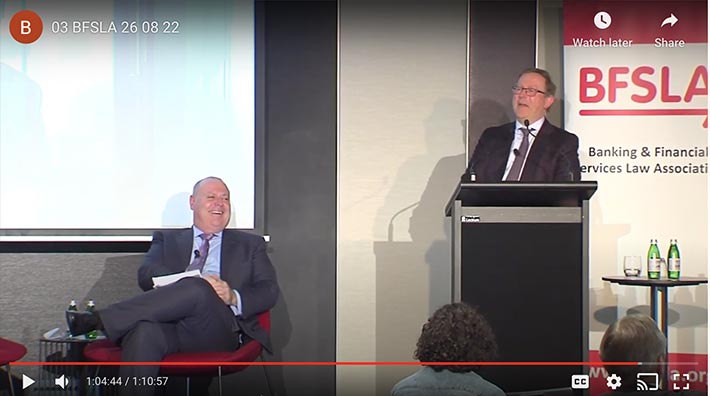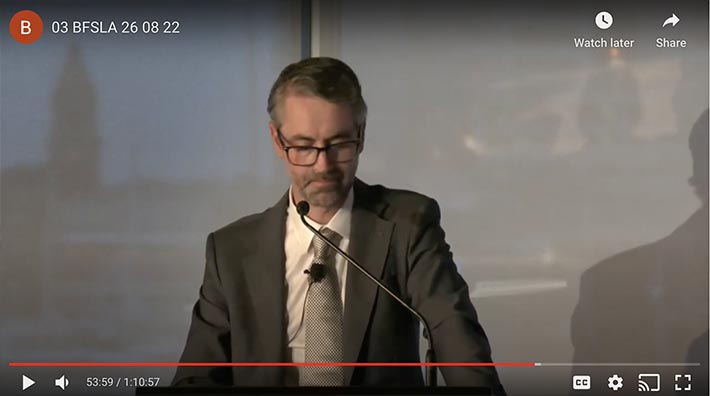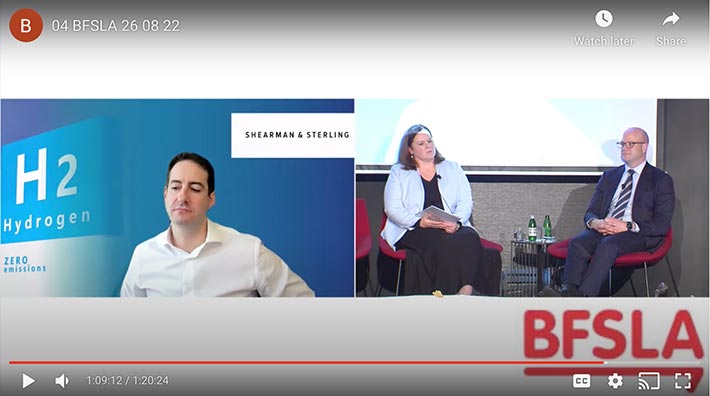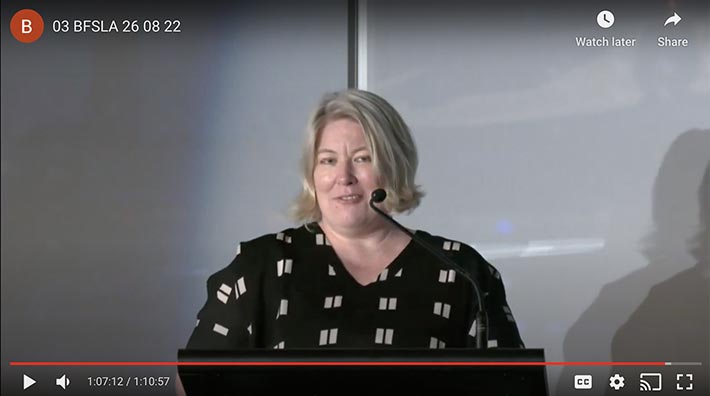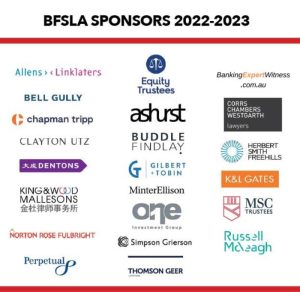The BFSLA held its 2022 conference as a hybrid event with delegates able to attend in person in either Sydney or Auckland, as well as via our virtual online platform.
I had hoped that we would all be together in Queenstown last year but only an extremely courageous President could have predicted the situation with international borders in early 2022!
Given the tumultuous times we had lived through with lockdowns, extended periods of working from home compounded by the closure of both state and international borders, our theme for last year’s conference was ‘Reuniting to Explore New Frontiers’.
The conference explored new frontiers across our industry including the future of money, developments in carbon trading and the financing of hydrogen projects to name but a few.
We were delighted to welcome Chief Justice Allsop of the Federal Court of Australia as our keynote speaker. His Honour addressed us on ’Piercing the corporate veil: recent international developments’. We were also honoured to welcome Justice Miharo Armstrong, of the Māori Land Court, Te Whānau a Apanui as a panelist in our opening New Zealand Session on Access to Capital for Māori landowners.
I am indebted to our Conference Planning Committee who once again put together a wonderful and varied program for the 2022 conference.
A reminder that if you attended the conference or are a member of BFSLA you can access the presentations and papers from our website www.bfsla.org (note password protected).
- Katrina Gardiner, ANZ and BFSLA Board member opening the New Zealand conference.
New Zealand opened the Conference with a karakia from Renata Blair, Head of Maori Business, Bank of New Zealand. The first Conference session on “Access to Capital for Māori Landowners” then followed, with a small but engaged Auckland audience (with a breakfast streaming to our Sydney colleagues). Juliet Tainui-Hernandez, Assistant Governor, Te Pūtea Matua / RBNZ introduced the session. This was followed by a scene setting presentation from Judge Miharo Armstrong, of the Māori Land Court. Judge Armstrong spoke to the history of Māori land, the role of the Māori Land Court and the barriers that those landowners face when seeking access to capital. Te Aopare Dewes, Hoa rangapū / Partner, Chapman Tripp and Renata then joined for a panel Q&A chaired by Juliet. The informative and thought-provoking discussion centred on ways to improve the ability to use Māori land as loan collateral. The panellists also touched on the wider issues canvassed in a paper released by the RBNZ on Māori Access to Capital, and the role of the banking and financial services sector as part of the solution.
After the formal opening of the Conference in Auckland our President, James Connell, opened the conference at 8:30am/10:30am Sydney/Auckland time.
The keynote address was given from the then Chief Justice of the Federal Court of Australia, the Hon James Allsop AC, on “Piercing the Corporate Veil: recent international developments.” After a fulsome introduction by the session chair, BFSLA Vice-President Dr Nuncio D’Angelo, his Honour began by examining the historical and public policy underpinnings of this foundation stone of Anglo-Australian company law, dating back to the famous 1897 Salomon decision in the House of Lords. He then fast-forwarded to several recent decisions in the UK, Singapore, New Zealand, and Australia to show how the doctrine had evolved over time, and how it is often conflated with other principles by which a shareholder or parent may be liable for the acts of a corporation, particularly in tort. His Honour also touched on statutory embodiments of the rule, and examined they ways in which the doctrine has evolved in different directions in United States jurisprudence.
Following his Honour’s keynote address, the Conference then turned its gaze to “The Future of Money”. Chaired by Rebecca Hope, BFSLA director, experts Drew Bradford (NAB), Jeremy Muir (MinterEllisonRuddWatts) and Joni Pirovich (Blockchain & Digital Assets – Services + Law) provided an overview of the types of different tokens available and a taxonomy of stablecoins, highlighting that not all stablecoins are created equal. This led to a fascinating discussion of stablecoins within the monetary base and their differing economic growth contribution depending on whether the issuer is a central bank, commercial bank, or non-bank. The speakers then discussed some recent real-world examples of stablecoin transactions, highlighting the benefits of using a stablecoin over fiat currency, as well as some of the challenges of the existing regulatory environment. The speakers noted the UK Law Commission’s proposal to introduce a new class of property right to ensure that rights in data objects are adequately protected. Finally, the speakers gave practical tips for things to look out for when acting on transactions involving stablecoins.
The next session explored the answer to the question in the New York decision in Revlon where an agent bank that was unable to recover from syndicate banks erroneous payments of principle made because of a systems error. This has generated some consternation around the globe. Chaired by Anna O’Sullivan (BNY Mellon) with speakers Ian Jackman SC (8 Selborne Chambers) and Peter Watts KC (Bankside Chambers) they explored the answer to that question and also the restitutionary rights of agents and financial institutions in similar roles and the defences available to payees.
Following on from this session, The Head of Commodities at Jarden, Nigel Brunel, chaired the session on carbon trading markets in Australia and New Zealand by Ilona Millar (Partner, Gilbert + Tobin) and Stephanie de Groot (Partner, MinterEllisonRuddWatts). Nigel outlined the key commercial and structural differences between the markets, in particular, the long-established regulatory structure in New Zealand (and size of the compliance market) compared to the political uncertainty in Australian and relatively larger size of the voluntary market. Ilona provided an excellent summary of the key components of the Australian carbon market, its regulatory structure, the types and legal treatment of carbon units and legal documentation (trading, sale, and security arrangements) and touched on changes that the newly elected Federal Government may introduce. Stephanie provided a similar description of the established New Zealand carbon market, including the differences with the Australian market (such as it not being a financial product) and the generation, sale and surrender of carbon units and security arrangements.
AML reform is currently front of mind to both Australia and New Zealand, with the New Zealand Ministry of Justice (MOJ) Statutory Review due to report mid-2022, the Australian Senate Committee Inquiry report released in March 2022, and the previous AML-CTF Statutory Review Report slowly winding into “phase 1.5” amendments last year.
This session chaired by Simon Jensen (Buddle Findlay) with speakers Gary Hughes (Britomart Chambers) and Peter Haig (Allens) who looked at lessons from the New Zealand Review and the Australian Inquiry as well as themes in both jurisdictions as to:
1. likely priorities for legislative reform.
2. practical implications of the KYC and other compliance changes most likely to gain traction.
3. what Australia can learn from New Zealand, including as to successes and problems, implementing Tranche 2 reforms for lawyers, accountants, real estate.
4. what New Zealand can learn from Australia, including as to supervision and enforcement.
5. emerging challenges from technology (e.g., biometrics, anonymity, virtual assets), and regulatory expectations about technology in AML compliance to assist in identifying and reducing risk; and
6. recent enforcement and investigative trends.
Quid Pro Quo: what’s a representation worth?
With increasing focus being put on company officers issuing documentation to lenders containing representations and statements in relation to drawdown notices and other information provided under finance documentation, and how that later plays out in a distress or insolvency scenario. Chaired by Tony Berriman (MinterEllison, stepping in for Matthew Cunningham who had sadly come down with Covid), with speakers Tony Ryan (Ashurst) and James Caird (Simpson Grierson) this session discussed recent issues in this context, particularly in relation to the risk of potential liability to lenders if it is later alleged that the statements were incorrect.
The last session for the day was “Hydrogen Projects – the USD188bn Pipeline”
Jo Crew, a project finance Partner at King & Wood Mallesons opened the session by describing reasons why many countries are looking at hydrogen production and use, including decarbonisation, rising cost of oil and gas and an unwanted dependency of Russian supply. Jo said there were 160 hydrogen projects planned, with a number of mega projects for export. The Head of Hydrogen at the Clean Energy Finance Corporation, Rupert Maloney, outlined the hydrogen production process, technical issues, and structuring challenges in making projects ‘bankable’, as no projects in Australia have reached financial close and no hydrogen has been sold. Dan Feldman (Project Development Partner at Sterling & Sherman) works on the largest hydrogen projects globally and said the absence of a hydrogen spot market and huge upfront capital costs provides a formidable but not insurmountable challenge in funding the projects. Dan and Rupert also discussed the impact of very large tax credits being provided by the Inflation Reduction Act (US) in pulling capital into the US market for hydrogen and the uncertainty created by inconsistent green labelling in importing nations. As Jo said, if we look ‘between the hype and hope’ project finance will play an important role in hydrogen production which should facilitate the decarbonisation of certain industries.
With the close of the conference, we thanked all the delegates, speakers and board members for the contribution to the conference.
- Emma Sutcliffe, Chapman Tripp and BFSLA Board member closes the conference in New Zealand.
Thank you to our sponsors
We thank our many sponsors for the 2022 conference for the valuable support, and acknowledge:
BFSLA Conference 2023
This year’s conference will be held in Queenstown, New Zealand in person and also via webinar virtual link from 2nd to 4th of September 2023 at the QT Hotel, Queenstown.
We look forward to welcoming all to this year’s conference.

